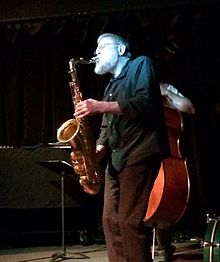Lewis Barry Tabackin (born March 26, 1940)[1] is an American jazz tenor saxophonist and flutist. He is married to pianist Toshiko Akiyoshi with whom he has co-led large ensembles since the 1970s.
Lew Tabackin | |
|---|---|
 | |
| Background information | |
| Birth name | Lewis Barry Tabackin |
| Born | March 26, 1940 Philadelphia, Pennsylvania, U.S. |
| Genres | Jazz |
| Occupation | Musician |
| Instrument(s) | Tenor saxophone, flute |
| Years active | 1962–present |
| Labels | RCA Victor/BMG, Discomate, Inner City |
| Website | www |
Biography
editTabackin started learning flute at age 12, followed by tenor saxophone at age 15.[2] He has cited Al Cohn[2][3] and Coleman Hawkins[2] as influences on saxophone, while his flute role models include classical players such as William Kincaid, Julius Baker, and Jean-Pierre Rampal.[2] Tabackin studied flute at the Philadelphia Conservatory of Music and also studied music with composer Vincent Persichetti. In 1962 he graduated from the Conservatory and after serving with the U.S. Army worked with Tal Farlow. He also worked with Chuck Israels in New York City[2] and a band that included Elvin Jones, Donald Byrd, and Roland Hanna. Later he was a member of The Dick Cavett Show band and The Tonight Show Band with Doc Severinsen.[4] He moved from New York to California with The Tonight Show in 1972.[3] During this time he played with Shelly Manne and Billy Higgins.[3]
Tabackin met Toshiko Akiyoshi in 1967 while he was playing in Clark Terry's band and he was invited to sit in for Don Friedman.[3] They formed a quartet in the late 1960s, married in 1969,[5] and in 1973 co-founded the Toshiko Akiyoshi – Lew Tabackin Big Band in Los Angeles,[3] which later became the Toshiko Akiyoshi Jazz Orchestra featuring Lew Tabackin, playing bebop in Duke Ellington-influenced arrangements and compositions by Akiyoshi. Tabackin was principal soloist for the band from 1973 through 2003.
Critic Scott Yanow describes Tabackin as "one of the few jazz musicians who has been able to develop completely different musical personalities on two instruments", with his forceful hard bop style on sax contrasting with his delicate flute playing.[6]
Jazz Foundation of America
editTabackin supports the Jazz Foundation of America in its mission to help elderly jazz and blues musicians, including those affected by Hurricane Katrina. He has sat on the Advisory Committee of the Foundation since 2002.[7]
Discography
edit
As leader or co-leaderedit
Toshiko Akiyoshi – Lew Tabackin Big Bandedit
Toshiko Akiyoshi Jazz Orchestra featuring Lew Tabackinedit
Akiyoshi - Tabackin Big Band compilationsedit |
As sidemaneditWith Toshiko Akiyoshi
With Donald Byrd
With Benny Carter
With Harmonie Ensemble/New York
With Shelly Manne With Duke Pearson
With Carla White With others
Videoedit
|
Awards and honors
editDownBeat magazine Critic's Poll winner:[12]
- Jazz Album of the Year: 1978 (Insights)
- Big Band: 1979, 1980, 1981, 1982, 1983
- Flute: 1980, 1981, 2010
DownBeat magazine Readers' Poll winner:
- Big Band: 1978, 1979, 1980, 1981, 1982
- Flute: 1981, 1982
Grammy Award nominations:
- Best Jazz Instrumental Performance - Big Band: 1976 (Long Yellow Road), 1977 (Road Time), 1978 (Insights), 1979 (Kogun), 1980 (Farewell), 1981 (Tanuki's Night Out), 1984 (Ten Gallon Shuffle), 1985 (March of the Tadpoles), 1992 (Carnegie Hall Concert), 1994 (Desert Lady / Fantasy)
Swing Journal awards:
- Gold Disk: 1976 (Insights), Silver Disk: 1974 (Kogun), 1979 (Salted Gingko Nuts), 1996 (Four Seasons of Morita Village)
References
edit- ^ Colin Larkin, ed. (1992). The Guinness Who's Who of Jazz (First ed.). Guinness Publishing. p. 384/5. ISBN 0-85112-580-8.
- ^ a b c d e Joffe, Edward (November 2006). "An Interview with Lew Tabackin". Joffe Woodwinds.
- ^ a b c d e Jazz, All About (4 April 2003). "A Fireside Chat With Lew Tabackin". All About Jazz. Retrieved 20 November 2018.
- ^ Feather, Leonard; Gitler, Ira (1976). The Encyclopedia of Jazz in the Seventies. New York: Horizon. ISBN 9780818012150.
- ^ Freedman, Samuel G. (15 June 2012). "Studying and Living Jewish-Asian Intermarriage". The New York Times. Retrieved 20 November 2018.
- ^ Yanow, Scott. "Lew Tabackin". AllMusic. Retrieved 20 November 2018.
- ^ "Jazz Angels pt. 2 - JFA's Wendy Oxenhorn on HammondCast KYOURADIO". Archive.org. Retrieved August 2, 2021.
- ^ "Jazz At the Castle (Jazz na Hradě) - Album by Lew Tabackin Quartet". Spotify.
- ^ Dryden, Ken, "Lew Tabackin: Jazz na Hradě (2009)," allaboutjazz.com. Accessed 2011 September 26.
- ^ Mosaic Records, Mosaic Select Vol. 33 Archived 2008-10-06 at the Wayback Machine. Accessed 2008 September 19.
- ^ "Toshiko Akiyoshi Orchestra | Strive for Jive | Lew Tabackin | Frank Wess | Big Band DVD". Archived from the original on 2010-07-18. Retrieved 2009-08-28.
- ^ "Down Beat Magazine". 27 September 2007. Archived from the original on 27 September 2007. Retrieved 20 November 2018.